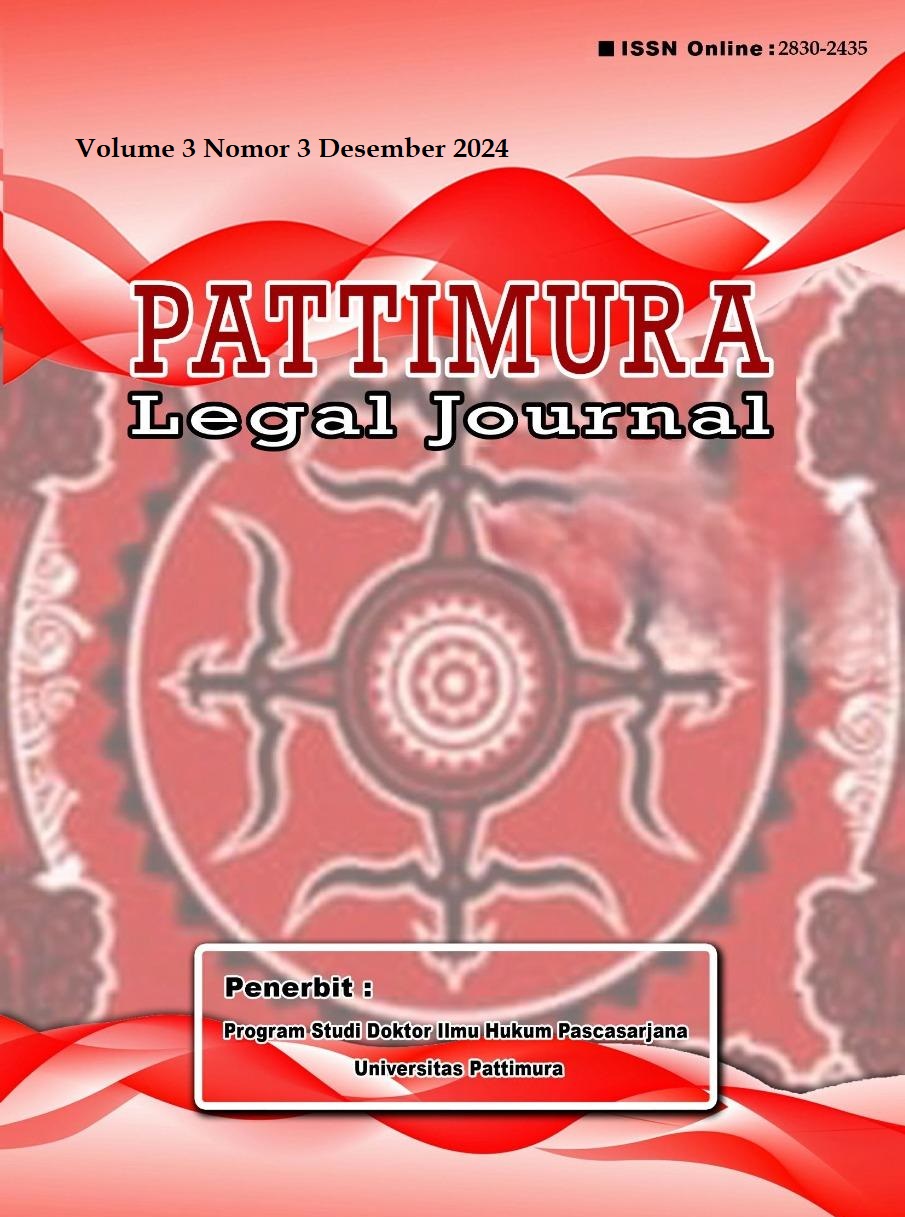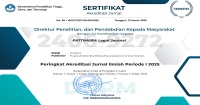Dampak Kebijakan Otonomi Daerah Terhadap Pemberdayaan Masyarakat Lokal
Abstract
Introduction: Regional autonomy gives regional governments more authority in managing local resources and policies. This has the potential to strengthen community empowerment by increasing participation, access to public services, and more effective local economic management. However, challenges such as inequality and lack of local capacity are still obstacles in realizing this potential.
Purposes of the Research: It is hoped that this study will provide a clearer picture of the successes and challenges faced in implementing regional autonomy, as well as provide recommendations for increasing the effectiveness of this policy in empowering local communities more optimally.
Methods of the Research: This research method uses a normative approach with literature study, reviewing journals, books and other sources to analyze the impact of regional autonomy policies on empowering local communities, as well as the legal and social implications they cause.
Results of the Research: This research reveals that regional autonomy policies have a significant impact on the empowerment of local communities. On the one hand, decentralization allows local governments to be more responsive to local needs and optimize regional resource potential. However, on the other hand, the implementation of this policy is sometimes hampered by the lack of local government capacity in managing resources and lack of coordination between agencies. However, in several regions, regional autonomy has succeeded in increasing community participation in decision making and strengthening local economic capacity, which ultimately supports community welfare and strengthens social resilience at the local level.
Downloads
References
Jurnal
Ahmad Robi. “Pengawasan Penyelenggaraan Asas Desentralisasi Dalam Pemerintah Daerah Berdasarkan Uu No 23 Tahun 2014 Tentang Pemerintahan Daerah.” Sosio Akademika 13, no. 1 (2023): 54–68.
Arya Fernandes. “Pencapaian Dan Tantangan Otonomi Daerah: Faktor Kepemimpinan, Kelembagaan, Dan Stabilitas Politik Lokal.” CSIS Indonesia 1, no. 1 (2022).
Dadang Sufianto. “Pasang Surut Otonomi Daerah Di Indonesia.” Jurnal Academia Praja 3 (2020): 271–88.
Dewi Mulyanti. “Konstitusionalitas Pengujian Peraturan Daerah Melaluijudicial Review Dan Executive Review.” Jurnal Ilmiah Galuh Justisi 5, no. 1 (2017): 134. https://doi.org/10.25157/jigj.v5i1.238.
Fahri, Marratu. “Faktor Pendukung Kebeehasilan Penyelenggaraan Otonomi Daerah.” Jurnal Ilmu Pemerintahan 1 (2022): 22–31.
Ferdian, Andri, Ismail, and Dewi Iryani. “Peran Pemerintah Daerah Ditinjau Dari Aspek Pemberdayaan Masyarakat Dalam Bidang Ekonomi, Pendidikan, Sosial Budaya, Psikologi Dan Politik Andri.” Jurnal Inovasi Global 2, no. 3 (2024): 543–51.
Ferizaldi. Dinamika Otonomi Daerah Di Indonesia, 2016.
Firna Novi Anggoro. “IUS Constituendum Harmonisasi Kontrol Yudisial Terhadap Penyalahgunaan Wewenang Pejabat Pemerintahan.” Jurnal RechtsVinding 13, no. April (2024): 117–32.
Habibi, Muhammad. “Ketimpangan Pembangunan Daerah Di Era Otonomi Daerah.” Multiverse: Open Multidisciplinary Journal 3, no. 1 (2024): 59–63. https://doi.org/10.57251/multiverse.v3i1.1412.
Ismiyanto, Ismiyanto, and Firstnandiar Glica Aini Suniaprily. “Politik Hukum Dalam Upaya Perancangan Kebijakan Publik Otonomi Daerah Pada Masa Reformasi.” Jurnal Penelitian Serambi Hukum 16, no. 02 (2023): 211–21. https://doi.org/10.59582/sh.v16i02.870.
Jamaluddin, and M. Najeri Al Syahrin. “Studi Komparasi Implementasi Dan Tantangan Kebijakan Otonomi Daerah Di Sumatera Dan Papua Jamaluddin1*,.” Jurnal Noken: Ilmu-Ilmu Sosial 9, no. 1 (2023): 1–10.
Kusnadi, Agus. “Re-Evaluasi Hubungan Pengawasan Pusat Dan Daerah Setelah Berlakunya Uu No. 23 Tahun 2014 Tentang Pemerintahan Daerah.” Arena Hukum 10, no. 1 (2017): 61–77. https://doi.org/10.21776/ub.arenahukum.2017.01001.4.
Mahanani, Anajeng Esri Edhi. “Urgensi Desentralisasi, Dekonsentrasi Dan Tugas Pembantuan Dalam Menjamin Keutuhan Negara Kesatuan Republik Indonesia.” Res Publica 1, no. 2 (2020): 17–35.
Ra’is, Dekki Umamur. “Kebijakan Pemberdayaan Masyarakat Dalam Perspektif Asas Rekognisi Dan Subsidiaritas Undang-Undang Desa Nomor 6 Tahun 2014.” Reformasi 7, no. 1 (2017): 29–46.
Rahman, Dahlan A, Abu Bakar, M Rizwan, Bimby Hidayat, Fakultas Ilmu, Ilmu Politik, and Universitas Malikussaleh. “Peran Pemerintah Daerah Ditinjau Dari Aspek Pemberdayaan Masyarakat Dalam Bidang Ekonomi, Pendidikan, Sosial Budaya, Psikologi Dan Politik.” Jurnal Pemerintahan Dan Politik 9, no. 3 (2024): 183–94.
Rika Santina. “Pengaruh Desentralisasi Dan Otonomi Daerah Terhadap Kesejahteraan Masyarakat Di Indonesia.” Jurnal Review Pendidikan Dan Pengajaran 7 (2024): 1861–64.
Rosyda. “Pengertian Otonomi Daerah: Tujuan, Prinsip, Asas, Dan Landasan Hukum.” gramedia.com, 2021.
serang-cilacap.desa.id. “Kekuasaan Lokal: Autonomi Dan Pemberdayaan Masyarakat Di Tingkat Daerah,” 2024.
Setyadi, Sugeng, and Oki Oktaviana. “The Analyze Of Investment For Alleviating Unemployment Problems in Banten Province.” Jambura Equilibrium Journal 3, no. 1 (2021). https://doi.org/10.37479/jej.v3i1.10027.
Waluya, Muhamad Rizki, Janthy T Hidayat, and Novida Waskitaningsih. “Arahan Pengembangan Untuk Mengurangi Ketimpangan Wilayah Antar Kabupaten / Kota Di Provinsi Banten.” JENDELA KOTA: Jurnal Perencanaan Dan Pengembangan Wilayah Dan Kota 1, no. 3 (2024): 1–13.
Buku
Afdhal, Afriansyah, Ahmad Mustanir, Annisa Ilmi Faried Aksal Mursalat, Iwan Henri Kusnadi Rusydi Fauzan Amruddin, Duwi Siswanto, and Rina Widiyawati Abdurohim. Pemberdayaan Masyarakat. PT Global Eksekutif Teknologi, 2023.
A. Hasdiansyah, Pemberdayaan Masyarakat. CV. Eureka Media Aksara, 2023.
Ferizaldi. Dinamika Otonomi Daerah Di Indonesia, 2016.
Mulkan, Hasanal, and Serlika Aprita. Hukum Otonomi Daerah. Mitra Wacana Media, 2023.
Online/World Wide Web, Dan Lain-Lain
Rosyda. “Pengertian Otonomi Daerah: Tujuan, Prinsip, Asas, Dan Landasan Hukum.” gramedia.com, 2021.
serang-cilacap.desa.id. “Kekuasaan Lokal: Autonomi Dan Pemberdayaan Masyarakat Di Tingkat Daerah,” 2024.
Copyright (c) 2024 Annisa Rohim (Author)

This work is licensed under a Creative Commons Attribution-NonCommercial 4.0 International License.
Authors who publish their manuscripts in this Journal agree to the following conditions:
- The copyright in each article belongs to the author, as well as the right to patent.
- Authors are able to enter into separate, additional contractual arrangements for the non-exclusive distribution of the journal's published version of the work (e.g., post it to an institutional repository or publish it in a book), with an acknowledgment of its initial publication in this journal.
- Authors are permitted and encouraged to post their work online (e.g., in institutional repositories or on their website) prior to and during the submission process, as it can lead to productive exchanges, as well as earlier and greater citation of published work.
- Authors have the right to self-archiving of the article (Author Self-Archiving Policy)






















